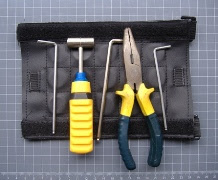Magnetic Chuck can provide variable holding power, which greatly improves their ability to support a wide range of machining applications.
Magnetic
chucks are designed for holding ferro-metallic work pieces with a strong,
uniform holding force. They consist of an accurately centered permanent
magnetic face that works in conjunction with an operator actuated permanent or
electromagnet. The work piece closes the magnetic loop to create a secure
anchor for the work piece.
Electromagnet vs. Permanent Magnet
Both
permanent magnets and electromagnets can be used to produce a magnetic holding
force. The choice of a permanent or electromagnetic design is dependent upon
both machining applications and externalities. Since permanent magnets do not
require electrical power, they are best used when there's no power available or
it is unreliable. On the other hand, the magnetic field of permanent magnetic chucks
cannot be adjusted, which can be a drawback for machining applications that
require variable holding power. In applications where a variable holding power
is required, an electromagnetic chuck is the better solution.
Operation of Electro Magnetic Chuck
Electromagnetic
chucks are constructed with electrical coils wound around a steel core embedded
in the chuck. To energize the electromagnetic field, a chuck controller is used
to generate a variable DC voltage in the chuck's coils. The coil's electromagnetic
field causes particles within the ferro-metallic work pieces to be aligned in a
common direction. This alignment creates the electromagnetic holding force
between the work piece and the chuck. The chuck's poles are magnetic as long as
voltage is applied.
The Advantage of
Variable Holding Power
Variable
holding power greatly improves the chuck's ability to support a wide range of
machining applications that include cutting, milling, shaping, EDM, high speed
cutting operations and thin work for grinding. Electromagnetic chucks can
easily be interfaced with machine centers for automation purposes.
Variable
holding power is critical for thin work applications. For example, when a part
to be machined is thin-0.25 inch or thinner-and the part is presented to a
machine operator as one of a stack of similar parts, the piece must be lifted
from the stack. Industrial Magnet is
not designed to lift only one piece from a stack of ferro-metallic parts.

